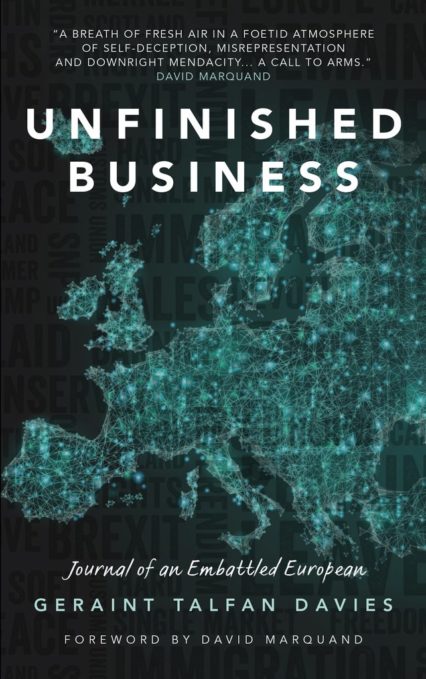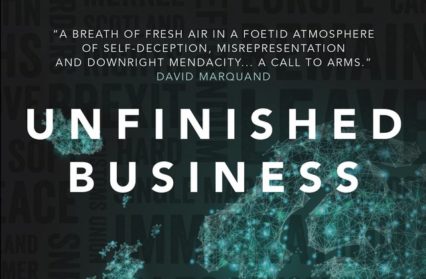Nigel Jarrett reviews Geraint Talfan Davies’, Unfinished Business, a novel that explores the implications of Brexit for Britain & Wales.
Geraint Talfan Davies’s book on Europe and Brexit is of the moment and, by definition, being overtaken by events. But its title will never date, whatever the outcome of disengagement. The consequences of our withdrawal from Europe will be felt for decades. Talfan Davies, a leading figure in the cultural and intellectual life of Wales, is a Remainer who believes that the implications of Brexit for Britain and Wales, in particular, are set to be catastrophic. So is his book merely an extended argument, now practically redundant (but one never knows), for staying in the European Union – we could certainly do with level-headed assessment, even a retrospective one – or is it a deeper existential survey of what’s at stake? Well, both. At the time this review was written, Theresa May’s government was still fractured by long-standing divisions and paralysed by inaction. What would a Labour government led by Jeremy Corbyn, saddled with its own internal schisms, have done, faced with finding a way of enacting ‘the will of the people’?

At the end of his book, Talfan Davies quotes lawyers Andy Tarrant and Andrea Bondi (Unfinished Business, though modestly annotated, does not give the source of findings such as theirs), who believe that of the twenty-six economic measures in the 2017 Labour manifesto, most would not be affected by EU rules on state aid. Of those that could, most again would be exempted. This is important in any mention of what many believe does not exist: to wit, a Labour objection to EU membership. The idea that most socialists are internationalist and Remainers was confounded by the support for Brexit in core working-class constituencies, and it’s not patronising to say that these may have been influenced more by the political Right and its mendacious slogans than by any Marxist view of the EU as a corrupt, self-serving business club. It’s a problem for Corbyn and for Labour Remain MPs in places that voted to exit the EU. But there is a Leftist case for leaving behind what some see as the crumbling European edifice.
Talfan Davies, chairman of Wales for Europe, was former and, inter alia, Controller of BBC Wales and former chairman of Welsh National Opera. He was trained as a newspaper journalist. Unfinished Business consists of articles written at various times for Welsh publications, starting in 2005 with a Holocaust reminder then jumping to 2011 as he begins chronicling with astute commentary the path to Brexit. He is a Europhile and a supporter of devolution and the Welsh Assembly government. Moreover, he voted in the 2011 referendum for more law-making powers for the Assembly. A journalist in Wales can be all of these and, more or less, write objectively about political events and issues surrounding them. But there’s no obfuscation of where Talfan Davies stands in relation to these essays. In the matter of Brexit, we may be desperately short of objectivity and explication; we have also been in need of extended, rational, and non-hysterical justifications, by their supporters, for both Leaving and Remaining. Davies clearly approves of the views of the historian David Marquand, who in his foreword to the book refers to the ‘motley crew of Brexiteers’, including the ‘preposterous’ Jacob Rees-Mogg. There we are, then. Sorted.
Well, not quite. The Left might not wish to be seen quaffing with Rees-Mogg, Farage and Johnson (the ‘Bullingdon Bugle’, as Davies refers to him) but it, too, has reasons for cutting ties with Europe as the Union is presently constituted. It sees the EU as a non-democratic haven for tax dodgers, monopoly corporations living off the investments of others, and serious organised crime. It believes the EU’s central bank to be anti-growth and supportive of deflation, stagnation and austerity; in short, it believes the EU to be Thatcherite. According to the Left, and others, it must be said, the Union’s attitude to immigration and its failing economic policies have led to the Far Right’s assumption of high political office, which will possibly continue unchecked. One might presume that Remainers do not share such a savage assessment (how could they, unless their Europhilia is powered by impossibly endless reforming zeal?), so one looks in vain in Unfinished Business for any suggestion that it might in some form or other be the case. If the Left is right, as it were, and given some gloss to efface any negative interpretation, it’s surely a wonder anyone among the current Brexit flag-carriers wants to leave. Such are the ironies, inconsistencies, and complexities of the whole issue, the continual subsuming of party politics under the canopy of the European Question. But Talfan Davies does not flinch in recognising that the EU is far from perfect. Quoting Marquand from his book The End of the West: The Once and Future Europe, he agrees that what’s always been needed is a deep and wide conversation about Europe’s meaning, mission, and purpose ‘and the means to fulfil them’. Cynics might say it’s a bit late for that, believing such a conversation to have been concluded by ideologues long ago in favour of the European project, which has turned inimical, undemocratic, and unmanageable, and is littered with unforeseen consequences.
We do need, is seeking a rehearsal of the issues from Remainer and Brexiteer and in spite of the European question’s transcendence, a clear idea of where they stand politically. Faced with casting a referendum vote, Josie and Joe Public in the main did not look to their political beliefs for any guide to consistency. Writing four years ago about another referendum, on Scottish independence, Talfan Davies notes that population (of the UK) and economic performance constituted a ‘significant determinant’ of our relationship with Europe. Scottish secession, the loss of population and wealth, would impact this. But the threat of independence for Wales had no ‘current’ credibility. So we get a clear idea of what kind of Remainer Welshman he is. That’s fair enough. He’s never less than consistent.
These articles, including ones on Auschwitz-Birkenau, the BMW factory in Munich, and a meditation on the killings at the French satirical magazine Charlie Hebdo (‘Death of Satire’), provide an informed and authoritatively partisan background to a seismic event, the inauguration of what he calls ‘Project Fantasy’, that may have changed the country forever and, as he also notes, threatens to destabilise the remaining EU, already braced against internal threats of disruption. Hoping for the best, he was dismayed when UKIP, the ‘Know-Nothing’ party, won seven seats in Assembly elections a month before the referendum on EU membership, despite his hope that ‘the better instincts of the Welsh people – democratic, compassionate, internationalist – will come to the fore and reject UKIP utterly.’ It’s been for Remain politicians and pro-Europe political writers a time of disappointment and dashed expectation. That said, and as he graphically interprets the referendum result, for every 17 who voted to leave the EU, 16 voted to remain. It was a close call. He also says it is ‘neither dishonourable nor undemocratic’ to seek to overturn the result.
Talfan Davies’s timely commentaries may be dated but they’re still relevant, lest we forget. Much of what he covers may come back to bite a post-EU British government, not to mention a Welsh Assembly and the those in Wales who voted for a UKIP cohort that would appear to have served its purpose, unless it sticks around and adopts more sinister ones. What of the foreground and the future?
As Parliament recesses for the summer, it’s an opportune time to read his book, particularly as more than half of it deals with the aftermath of the referendum, and while the cataract of developments has for a few weeks at least, dried up; recapitulation is never a bad thing and it’s a useful time for looking ahead. Twice, and bravely, he mentions the disparity in education – or educational ‘qualification’ – as the biggest single differentiator between Remain and Leave voters. Three-quarters of those with no qualifications voted to leave, while only 27% of people with post-graduate degrees did so. This is always a dodgy point: the political perception which rejected Churchill and the Tories as post-war leaders of a battle-weary Britain needing radical reconstruction and reform is something for which the electorate, not so easy to divide educationally at the time, has never been given credit. But it is interesting and it does relate to another subject: what Talfan Davies sees as the disproportionate threat to Welsh higher education and research. In the UK, European money accounts for about a third of competitive funding; in Wales, it is nearly two-thirds, which is why research in Welsh universities is still growing, and why Wales’s cultural ‘brand’, too, continues to enjoy high status.
As the options for changes in the government, or even a change of government, or a call for a centrist party or proportional representation, start to confuse the issue still further, Talfan Davies finds Jeremy Corbyn sending mixed signals. He asks if Corbyn is really trapped by tactical caution and his respect for the referendum vote or by his and Shadow Chancellor John McDonnell’s history of hostility to the EU. He believes Labour’s influence will be decisive but questions why it does not take a more robust pro-European line. Well, the reasons are enumerated in paragraph four of this review. Differences of opinion in Labour about how it should proceed so that it takes the country with it are the subject of much feverish discussion in backrooms, drowned anyway by the noisy re-positionings of Tories who want May to change tack if not withdraw altogether.
The final article in this exhaustive collection was written in March this year. It ends with a call to action. If we decide to opt for an isolated Britain that ‘fidgets on the fringes of everywhere,’ the author says, ‘we will have erected unnecessary borders on our shores and in our minds. We will have raised a tariff against neighbourliness.’ He concludes that we need to reassert democracy through a new referendum.
A compilation of contemporaneous articles on current affairs refers to past events. What Alex Salmond was or wasn’t about to do seven years ago is possibly neither here nor there, irrespective of his replacement by Nicola Sturgeon. But anyone who read these articles at the time of their publication will have been impressed by the way a point of view was informed by wide knowledge, access to relevant data, intelligence, wit and wisdom, attributes in short supply during the past couple of years. In collected form, and as the Brexit negotiations draw close to a point of no return, they may, in the short time available, give Leave voters cause to consider that their decision had unfortunate results, and encourage them to do something about it. Few of us in any case, Brexiteers or Remainers, could have presented such an eloquent case.
Unfinished Business is published by Parthian.
Nigel Jarrett is a winner of the Rhys Davies prize for short fiction and, in 2016, the inaugural Templar Shorts award. He’s a former daily-newspaperman and a regular contributor to the Wales Arts Review, Jazz Journal and Acumen poetry magazine, among others. He is also a poet and novelist. His latest story collection, Who Killed Emil Kreisler?, was published in 2016, as was his first novel, Slowly Burning. This year sees the publication of his short fiction pamphlet, A Gloucester Trilogy.
For more Wales Arts Review writing covering similar topics click here.



 Enjoyed this article? Support our writers directly by buying them a coffee and clicking this link.
Enjoyed this article? Support our writers directly by buying them a coffee and clicking this link.







